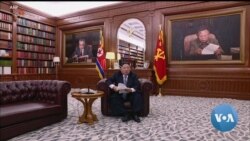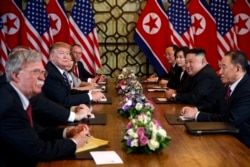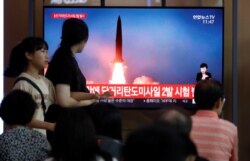There was lots of posturing but little progress in 2019, as the United States and North Korea spent much of the year trying to convince the other side to take the first step in nuclear talks.
With North Korea's end-of-year threats and its misguided belief that it can influence the 2020 U.S. presidential election, some fear the Korean Peninsula could soon return to a state of major tensions
2019 began with Kim Jong Un warning he may take a "new way" if the U.S. didn't soften its stance in nuclear talks. The world may soon find out just what that means.
Talks broke down after Donald Trump walked away from a February summit with Kim in Hanoi.
"They were willing to denuke a large portion of the areas that we wanted, but we couldn't give up all the sanctions for that ... we had to walk away from that,” Trump said.
Within weeks, North Korean rockets began flying. And kept flying. By some measures, 2019 was North Korea's busiest year ever for missile tests.
Though Trump shrugged off the short-range launches, the talks never got back on track, even after a third Trump-Kim meeting at the demilitarized zone. In October, North Korea was the one to walk away from working-level talks.
The North's top nuclear negotiator, Kim Myong Gil, blamed the U.S. "old viewpoint and attitude" for the breakdown.
Now, North Korea is giving signs it may conduct a long-range missile test, and is warning on an almost daily basis about Kim's end-of-year deadline, which U.S. officials have ignored.
Trump and Kim may soon return to exchanging threats of war instead of handshakes, says analyst Bong Young-shik.
"If North Korea engages in provocations toward the United States, it will only make Trump rely on Fire and Fury, even for the purpose of his reelection."
Bong is one of many analysts who is concerned things may get more tense in part because North Korea believes it can influence Trump's re-election chances.
"North Koreans are thinking the world revolves around North Korea ... it's a very unfortunate miscalculation and misunderstanding,” Bong said.
At least some of that perception may be driven by Trump, who has recently linked the two issues. That, despite polls suggesting foreign policy doesn't typically decide U.S. elections, points out analyst John Delury.
"I would say North Korea is extremely low on the list of key issues that are determining the election,” Delury said. “It would take almost a war really for North Korea to have an impact on who the next American president is."
Delury said there's a danger for miscalculation in 2020 if North Korea thinks it can influence the U.S. vote.
"Those political considerations won't be that significant,” Delury said. “And say a provocation at this stage will have a conventional, security, or even military response and they'll be surprised because they thought they were able to play US domestic politics, when in fact they're not. Everyone knows the election is not about North Korea."
Nonetheless, North Korea appears to be hardening its stance, recently suggesting denuclearization is off the negotiating table. It's also threatened am ominous "Christmas gift" to the U.S.
Because of comments like that, many fear that Fire and Fury, round two, could be around the corner.











